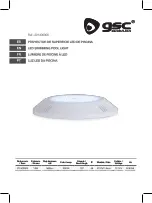
119A
SAVE THESE INSTRUCTIONS
(119IO) RECTANGULAR ULTRA FRAME POOL ENGLISH 7.5” X 10.3” PANTONE 295U 07/17/2013
English
Page 12
WINTER PREPARATIONS
Winterizing your Above Ground Pool
After usage, you can easily empty and store away your pool in a safe place. You must
drain, disassemble and properly store the pool when the temperature drops below 41
degrees Fahrenheit (5 degrees Celsius) to prevent ice damage to the pool and related
components. Ice damage can result in sudden liner failure or pool collapse. Also see the
section ‘’How To Drain Your Pool’’.
Should temperatures in your area not drop below 41 degrees Fahrenheit (5 degrees
Celsius), and you choose to leave your pool out, prepare it as follows:
1.
Clean the pool water thoroughly. If the type is an Easy Set Pool or an Oval Frame Pool,
make sure that the top ring is properly inflated.
2.
Remove the skimmer (if applicable) or any accessories attached to the threaded strainer
connector. Replace strainer grid if necessary. Be sure all accessories parts are clean and
completely dry before storage.
3.
Plug the Inlet and Outlet fitting from the inside of the pool with the plug provided (sizes 16'
and below). Close the Inlet and Outlet Plunger Valve (sizes 17' and above).
4.
Remove the ladder (if applicable) and store in a safe place. Be sure the ladder is completely
dry before storage.
5.
Remove the hoses that connect the pump and filter to the pool.
6.
Add the appropriate chemicals for the winter period. Consult your local pool dealer as to
which chemicals you should use and how to use them. This can vary greatly by region.
7.
Cover pool with Intex Pool Cover.
IMPORTANT NOTE: INTEX POOL COVER IS NOT A
SAFETY COVER.
8.
Clean and drain the pump, filter housing and hoses. Remove and discard the old filter
cartridge. Keep a spare cartridge for the next season.
9.
Bring pump and filter parts indoors and store in a safe and dry area, preferably between 32
degrees Fahrenheit (0 degrees Celsius) and 104 degrees Fahrenheit (40 degrees Celsius).
GENERAL AQUATIC SAFETY
Water recreation is both fun and therapeutic. However, it involves inherent risks of
injury and death. To reduce your risk of injury, read and follow all product, package and
package insert warnings and instructions. Remember, however, that product warnings,
instructions and safety guidelines cover some common risks of water recreation, but do
not cover all risks and or dangers.
For additional safeguards, also familiarize yourself with the following general guidelines
as well as guidelines provided by nationally recognized Safety Organizations:
• Demand constant supervision. A competent adult should be appointed as a “lifeguard” or
water watcher, especially when children are in and around the pool.
• Learn to swim.
• Take the time to learn CPR and first aid.
• Instruct anyone who is supervising pool users about potential pool hazards and about the use
of protective devices such as locked doors, barriers, etc.
• Instruct all pool users, including children what to do in case of an emergency.
• Always use common sense and good judgement when enjoying any water activity.
• Supervise, supervise, supervise.






























